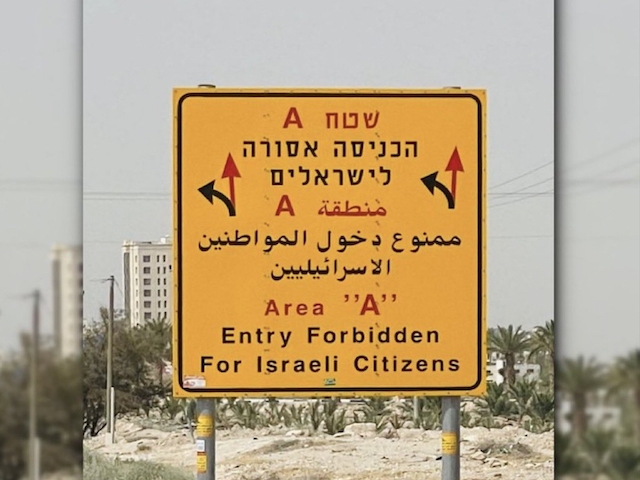Every week, thousands of Israeli cars enter and exit Palestinian Authority-controlled cities such as Jenin, Nablus, and Ramallah for reasons ranging from affordable shopping to higher education and family visits. These cars, while having Israeli license plates and carrying Israeli citizens, are differentiated by one aspect: the religion of their passengers. A concerning form of apartheid is emerging, where Muslims, Druze, and Christians are welcomed into Palestinian territories, while Jews enter at their peril.
It's essential to note that the subject of this article aligns with recognized definitions of racism. In today's global context, it's uncommon for any authority to threaten or harm someone based on their nationality or religion. For example, even in Putin's Russia, Ukrainians aren't persecuted merely for their nationality, but for their claimed connection to the Ukrainian government. Yet, in the Palestinian territories, local militants and the entire Palestinian Authority often face little criticism for their consistent hostility towards Jewish visitors, primarily based on their ethnicity and presumed religion.
A Palestinian in Khan Yunis distributes sweets following the murder of two Israelis in the West Bank town of Huwara on Saturday. pic.twitter.com/1KhunpR241
— Joe Truzman (@JoeTruzman) August 20, 2023
Throughout Judea and Samaria, entrances to Palestinian regions display prominent red signs in Hebrew, Arabic, and English, stating: “This road leads to [a] Palestinian village. The entrance for Israeli citizens is dangerous.” Although officially these signs intend to warn all Israelis that their security might not be guaranteed by the State of Israel beyond this point, in actuality, the main group at risk are those whose Arabic skills aren't strong enough to disguise their Jewish identity.
In recent times, Palestinian propaganda narratives have reframed these signs as part of a “Zionist Apartheid,” alleging they restrict Palestinian movement, similar to the discourse surrounding Israeli security checkpoints. If this were the case, Israeli settlements would feature similar warnings for Palestinians, but none are present.
Contrarily, cities and areas like Tel Aviv, West Jerusalem, Netanya, and Be’er Sheva, with a Jewish majority, are frequented by Arabs who work, shop, and partake in Israel's progressive and democratic culture. Palestinians routinely work in Israeli settlements in Judea and Samaria, and the Hebrew University of Jerusalem should honestly consider a name change at this point, given the prevalent use of Arabic on campus.
What a tragedy!
— Ayelet Azoury (@azoury_ayelet) August 19, 2023
Two Israelis were murdered by Arab terrorists in the town of Huwara. Two of the Israeli citizens who were murdered were a family, father and a son. They went to a place in Huwara where you could wash your car. The car wash company belonged to Palestinians and… pic.twitter.com/f6hwp9kIRw
For skeptics doubting this perspective, or thinking it is also part of an elaborate Israeli "hasbara" campaign, the village of Huwara on Samaria's Route 60 is a case in point. Yesterday, it became a focal point once again after two Israeli Jews were tragically killed while wating at a nearby car wash. Notably, Huwara lacks these warning signs, being in Area B of the Oslo Accords, under IDF jurisdiction; meaning Israel is not even putting up these signs based on the animosity of the locals towards Jews, but purely based on which areas legally they have some sort of jurisdiction over.
Ironically, despite prevalent antagonism in numerous Palestinian locales, many, likely most Israeli Jews feel relatively at ease around Arabs; after all more than half of them can trace their family tree back to the region's Arab kingdoms. Israeli-Arab towns like Abu-Ghosh and Kfar Qasim, and even some Palestinian villages, benefit from a considerable Jewish patronage. Even in potentially perilous areas like Huwara, some Jews, undeterred by the animosity, enter of their own accord, as did Shay Nigarkur and his son Aviad, who were killed this past Saturday after simply looking to fix their car's air conditioning.
There is NOTHING in the Palestinian society that is not geared towards terrorism and towards the indiscriminate killing of men, women and children.
— Real Palestinian 🇮🇱 (@shim_rational) August 20, 2023
The Palestinian National Movement is a death cult pic.twitter.com/EWh4LtnQiF
It's high time global leaders recognize the Palestinian Authority's policies as systematically and overtly racist. No individual should be barred from an area based on their religious beliefs or language. While Jews have faced grave dangers in contravention of these unwritten rules, it's the Palestinian community that endures the harshest consequences from these apartheid policies enforced by their local administrations.


